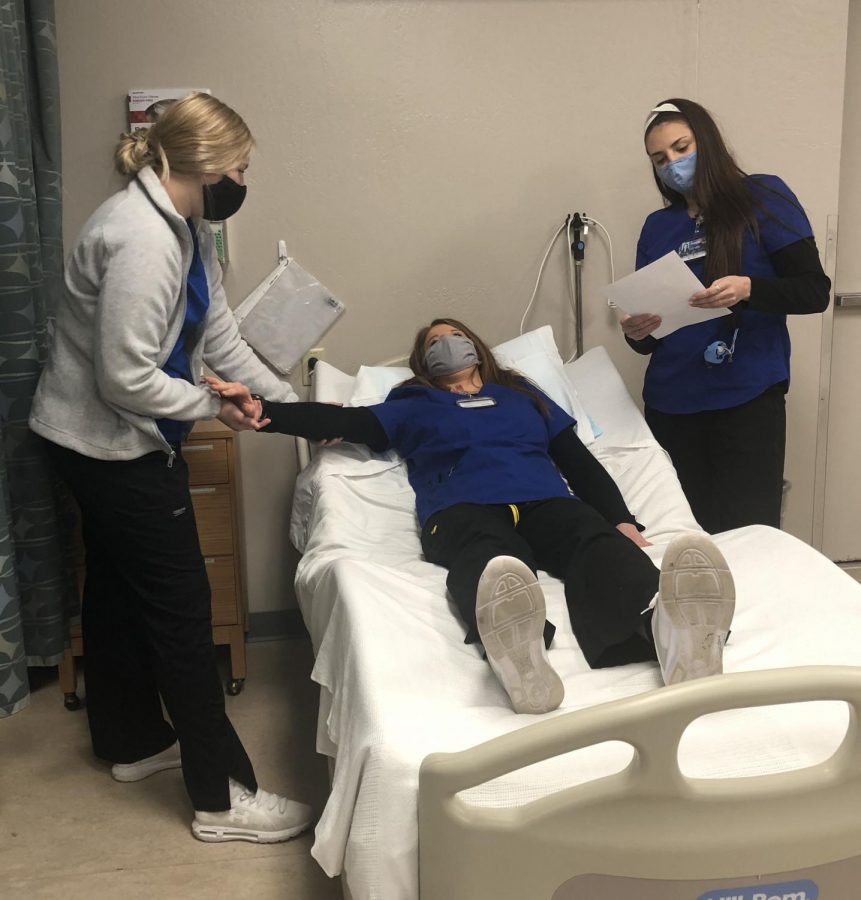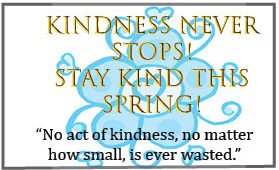Students serve as front line healthcare workers
Ewald practices her CNA skills on her partner at one of the in-person classes. This was her last class before she graduated. “I really like my classmates and my partner. When we are virtual we listen to the instructor as she goes through a slideshow and we go over all the stuff we need to learn,” Ewald said. “When we are in person we work with our partners and we practice all the skills on each other.”
November 30, 2020
Being a frontline worker along with attending high school comes with a lot of responsibilities. For a handful of students at Berlin High School, this is the case. Many of them go to school during the day and work as a front line healthcare worker at night as well as on the weekends.
Seniors Emily Goehring and Mikenna Prellwitz both work as front line workers at assisted living facilities where they are either a nursing assistant or a resident assistant.
“As a nursing assistant my job is to take care of the residents. This entails feeding them, changing them and pretty much doing anything for them,” Goehring said.
As a frontline worker during a worldwide pandemic like COVID-19, they are required to take many precautions as they attend the residents.
“For a period of time we had to wear gowns, googles, face shields, gloves and boots the whole shift. Every time you left a resident’s room you had to change,” Prellwitz said. “Even if you are just going in to get them water you have to change everything and it all goes in the garbage. With our googles we are required to wipe them down each time.”
Along with wearing protective gear in each resident’s room, they are also required to get tested often depending on where they work.
“To be able to work we have to get tested every five days. We have the rapid test so we are able to get our results back within 15 minutes,” Prellwitz said.
Many assisted living facilities are currently not allowing the residents to have visitors and this is true for both Omro Care Center where Goehring works and for Patriot Place where Prellwitz works, but somehow the virus still managed to contaminate both buildings.
“I believe that one of our workers brought it in and we had an outbreak,” Goehring said. “I happened to catch the virus from work and was quarantined for 10 days both from work and school. “
This was not the case for Prellwitz, as there happened to be an outbreak at the same time at her work, but she never caught the virus.
“I was in main contact with the resident who was positive because I was with her all weekend prior to the outbreak,” Prellwitz said. “I ended up being quarantined from school for 14 days, but they still allowed me to go to work because my tests were negative.”
As frontline workers, their job never stops. Even if a resident is positive they still have to tend to them just as if they were negative.
“If they are negative we just wear the N-95 mask plus our other gear, but if they are positive we put a surgical mask over our N-95 mask as well,” Goehring said.
Taking classes to become a nursing assistant or a resident assistant during a pandemic is not easy either. The class as a whole has a whole new look as it is different than previous years.
“Normally every class would be in-person and there would be a normal classroom setting such as a lab where they learn all of the techniques and stuff and then a clinical setting where they work with real live patients, which we cannot do because of COVID-19,” senior Corrin Ewald said. “This year some of our days are in-person and then the other half are virtual. When we are virtual we listen to the instructor as she goes through a slideshow and goes over all the stuff we need to learn. When we are in-person we work with our partners and we practice all the skills on each other.”
Taking the class online is something that Ewald never imagined, but by doing so she has truly made the most of it and plans to use class as a benefit in her future career.
“I am hoping to work at a hospital and not a nursing home when I turn 18 because you have to be 18 to work at a hospital. I will probably work as a CNA throughout college to make money especially in the summer,” Ewald said. “I do not want to go into nursing, but I do want to become an ultrasound tech. I thought it would be good to take the class because a lot of medical fields require you to take a CNA course anyway.”










